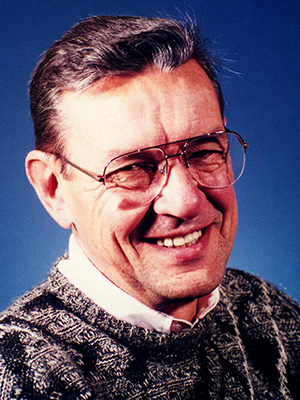Vegetable storage expert James Russell Hicks dies
By Craig Cramer

James Russell Hicks, an expert in vegetable storage and post-harvest physiology, died Nov. 26. He was 78.
Hicks’ career was dedicated to retaining the nutrition, flavor and consumer appeal of horticultural crops from field to plate. He is most known for his work on controlled atmospheric storage of cabbages and onions – two of New York’s most important vegetable crops. But he also worked with a wide variety of other crops, including carrots, sugar snap peas, sweet corn, broccoli, muskmelons, peppers, spinach, and winter squash.
“Jim was also a persistent advocate for improving taste and consumer appeal of tomatoes by harvesting at a riper stage,” notes Elmer Ewing, who was chair of the Vegetable Crops Department during most of Hicks’ tenure at Cornell.
Hicks’ Extension efforts targeted roadside markets as well as larger wholesale operations. He helped numerous growers use techniques like precooling crops in the field to preserve their freshness, or adopt growing practices that would lead to longer shelf-life.
Hicks was an innovative teacher, producing videos in the 1980s to illustrate different methods of grading and packing crops. He used the same technique while on sabbatical in Zimbabwe to train extension agents and farmers there in post-harvest practices.
“His on-going work with the Smallholder Horticulture Program in Zimbabwe was key to establishing an extension training program to help famers reduce losses of perishable commodities,” says Chris Wien, who was Vegetable Crops chair at the end of Hick’s career. Hicks also traveled to the Philippines, Taiwan, and Thailand to assess post-harvest losses of tropical vegetables for the Asian Vegetable Research and Development Center, and did other overseas work in Jamaica and Costa Rica.
Hicks received his bachelor’s degree from North Carolina State University in 1960, his master’s from the University of California-Davis in 1967 and doctorate from the University of Maryland in 1970, all in horticulture. He served as an assistant professor at the University of Florida from 1970 to 1975 before joining the Cornell faculty as an assistant professor in 1976. He had a joint appointment with the Institute of Food Science, and was praised for collaborations that crossed department lines. He was promoted to associate professor in 1981.
In 1983, he and two of his former colleagues at the University of Florida split the $200 honorarium from the Council Memorial Tomato Research Award from the Florida State Horticultural Society. Their research showing that new standardized shipping containers not only prevented damage as well as containers commonly used at the time, but they also allowed growers to fit 11 percent more tomatoes on every pallet and in every truck. If widely adopted in 1983, the new containers would have saved growers $6 million that year alone. The research helped convince Florida tomato growers to embrace the new containers, which they continue to use with minor modifications to this day.
Hicks was known as a careful planner, detailed executer and cautious evaluator not likely to make impulsive statements needing later clarification.
“He was a quiet, friendly man who possessed a remarkably wide range of knowledge in his field,” adds Ewing. “This made him effective in efforts at Cornell and around the world. And it also made him a wonderful colleague and a perfect team player.”
Craig Cramer is communications specialist in the Department of Horticulture at Cornell.
Media Contact
Get Cornell news delivered right to your inbox.
Subscribe